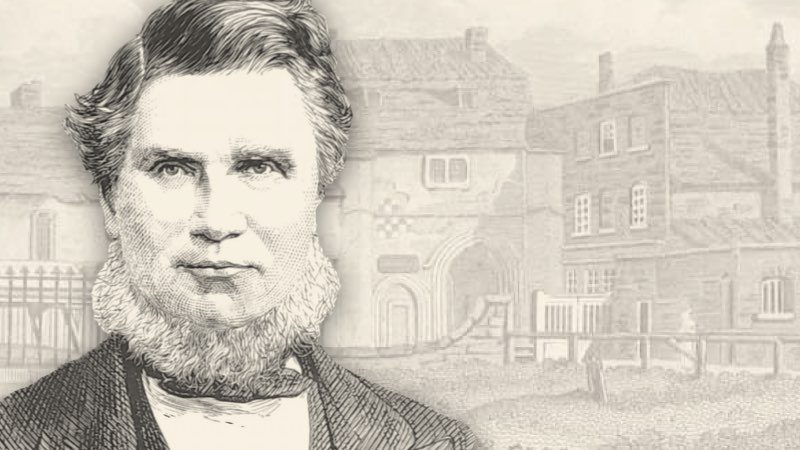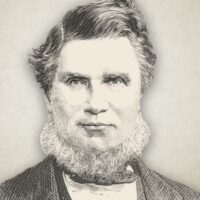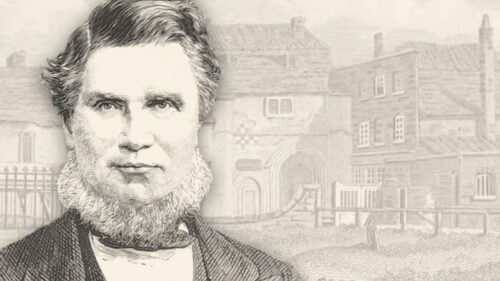
The Life And Testimony Of William Crowther
Earthen Vessel 1878:
Forty-Three Years In The Wilderness
“Fight the good fight or faith, nor turn aside
From fear of peril, from earth or hell;
Take to thee now the armour proved and tried;
Take to thee spear and sword. Oh! wield them well!
So shalt thou conquer here, and win the day,
Wearing the crown, when this hard life has passed away.”
A few Lord’s-days since, Mr. William Crowther, of Gomersal, Leeds, preached to his beloved flock at Lockwood the forty-third anniversary sermon, commemorative of his being brought, by the grace of God, into the fellowship of the Gospel, and into a happy association with the Church of Christ upon earth. Not simply in communion with any of those modern and fashionable Churches, where the doctrines and ordinances given to us by Christ and His apostles are increasingly slighted; not merely as a silent and almost useless member, but, Mr. William Crowther was, by the Spirit of God, constrained to unite himself with that section of the family of God who most unflinchingly adhere to those New Testament laws and ordinances which distinguish the Strict and Particular Baptists from all the other communities, now so varied and numerous, not in this country only, but also in the United States, in all our colonies, and in many parts of the European continent. Herein we must acknowledge the goodness and mercy of God in raising up such a witness, such a laborious worker, such a kind, benevolent, and charitable helper, to stand as in the front of those little cities of Judah, those, for the most part, small, weak, and much-despised Churches who need a valiant, undaunted, fearless, and devoted captain to encourage and cheer them in their seasons of trial and conflict often so very severe.
Not for one moment would we set up one good man above another. God forbid that we should be suspected of idolizing any one of the Lord’s saints or servants now in this world. That long and severely-afflicted child of God who has been almost prostrate on his bed, in his little Bethel, in Sturry (Samuel Foster), is as near and as dear to the Saviour’s heart as is the most illustrious servant in any part of the world. All the truly sanctified are complete in Christ, and all the redeemed shall be brought into one likeness, into one perfection, into one glory, in the Father’s home for ever. Nevertheless, in this wilderness state of the Church, wherein she is assailed and surrounded by foes of every sort and size, in this low condition of our Zion, wherein it is so evident that God hath (in the majority of cases) chosen the poor of this world, rich in faith and heirs of the kingdom, in the present hard warfare through which the faithful followers of the Lamb are passing, they require strong, able, and decided pioneers to go before, to go with, and to hail them on to the ultimate conquest, and to the prepared crown.
When, therefore, we see a man like William Crowther, a gentleman, a scholar, a large manufacturer, a justice of the peace, an honourable, and, in every sense, an influential leader—when we see such a man standing for years as the beloved pastor of one flock, also travelling hither and thither in different parts of the metropolis and in the provinces, seeing and assisting the Churches of Christ and the ministers thereof, we must herein admire the distinguishing grace of God, and praise His thrice-holy name for these His wonderful works. We must not enlarge.
We have great pleasure in giving, as a frontispiece to our new volume, a likeness of our highly-esteemed brother in Christ, Mr. William Crowther. Next month, the Lord permitting, we expect to give a condensed autobiography of his life and labours in the Gospel. That our gracious Master will condescend to bless our efforts to hand down to coming generations some testimonies of the good men of the present age (of whom we desire yet to give many) is the prayer of
The Editor Of The “Earthen Vessel”
———————————
A Testimony By William Crowther Of His Early Experiences
Born at Gomersal, April 2, 1816. My mother was a godly woman, a member of an Independent Church. My father was an honourable tradesman, but no professor. I was trained up in regular attendance on worship and preaching. In very early life had what are called strong religious feelings; had a tender conscience, and was afraid to do or say what I knew to be wrong. Soon met, however, with play-fellows whose example hardened and emboldened me in evil, and I learned to do many acts of external wickedness; but whenever I heard a funeral sermon, or when any serious event occurred, I was usually much concerned as to my state, and had strong convictions of the necessity of religion.
When between 13 and 14 years of age, I felt it was high time for me to begin a better life; for I felt if I were to die, I was too old to be treated as an infant, and should have to be held accountable for my own actions. I determined I would no longer keep company with profane boys, but would seek that of religious persons; and I began to read a good deal during my leisure from school duties. Read works of history, travel, &c., and lives of religious men.
At 14 to 15 years of age, became increasingly concerned about religion, and felt convinced I was not right, and was by no means as good as I ought to be. I began to pray instead of saying prayers which I had been taught, and to attend prayer and other religious meetings. I also became a Sunday school teacher, and regularly attended a teachers’ meeting that was begun about this time, at which a portion of Scripture was generally read, and, after reading, questions were asked by the minister; and sometimes, when a little difference of opinion was found to exist, a very interesting and instructive discussion would arise. The spirit of inquiry was greatly increased and very rapidly developed in me by these meetings, and I was intent on being able to answer and understand whatever questions might be proposed. By-and-bye I began to think I was becoming properly religious; began to take notes of sermons, and went on week evenings with the minister to a village near, where he conducted a weekly service, and sometimes I gave out the hymns for him. From this time till about 16 years of age, I was very zealous in religious pursuits, and had not for some months any doubt of my power to will and do what was acceptable to God; and thought it was my and every person’s duty to believe and obey, and that it was quite right that they should be damned if they did not. One or two old women at this time annoyed me a good deal with questions as to my theory of salvation, which led me, in conjunction with another young disciple (my senior by several years), to revise my creed. I was sorely puzzled about the mode of salvation. I had supposed that salvation sprung out of human effort, which was equally within the power of every man; but now I saw the statements of the Scripture were against this theory, and I came to the conclusion that it must be partly by works and partly by grace; but by-and-bye I found that would not do, so I settled it to be conditional on our having faith, which I believed it was the duty of all to have. But a Scripture took hold of me with an inexorable grip: “By grace are ye saved, through faith; and that not of yourselves, it is the gift of God.” This seemed to take all the go out of me—it shut me up completely for a time. I tried all sorts of ways on getting over or round this Scripture, but this, “it is the gift of God,” upset all my theories of duty-faith. I mentioned it to the minister, who replied, “If man has lost his power to obey, God has not lost His power to command.” I objected to this, and he then said, “If man cannot believe by himself, he can ask God for faith.” I further objected, “He cannot pray without faith, so faith must be given before he can pray.” He then said, “We must not be too metaphysical in our inquiries.” I appeared to be in a complete labyrinth for a time, and tried, but in vain, to frame some theory of salvation that should be consistent with the testimony of grace and human duty or responsibility; but one day my confusion was brought to a climax by one of the old women referred to, saying in reply to my statement of a newly-devised theory of mine, “But do you know there is a Scripture which says, “The Lord hath made all things for Himself, yea, even the wicked for the day of evil?” I first denied, and then expressed a doubt of the existence of such a passage. For some days it could not be found, but at length a concordance was borrowed, and it was discovered, to my great consternation and embarrassment. I knew not what to think or say, for I could not make it out in any way how it could be, or what it could mean; I was utterly bewildered.
At this time there was a conflict of another kind going on within me. I had been trying for some time to be good, and had set myself the task (which I had heard of others doing or trying to do) of living one whole day without sin. I prayed in the morning and formed resolutions, and then at night examined and reckoned up; and somehow, night by night, I found I had failed. I persevered in attempting this, but it proved a hopeless task. I tried specially to guard myself against certain easily-besetting sins; but so surely as I made a resolve against any one sin, that one sin would overcome me during the day. Matters in this way became very serious. I could not, for shame, ask God to forgive me when I kept sinning so inexcusably. I dare not kneel down to pray, and I dare not go to bed without praying. I tried sometimes to pray, avoiding the subject of any special confession of sin, and, in one way and another, became every day more miserable and helpless about my religion. I went on resolving, watching, sinning, repenting, till I was utterly sick of it, and could not tell what it must come to; but one feeling grew upon me—namely, “I must either give up sinning or give up praying.” I could not give up sinning, and I dare not give up praying. In this extremity, some relief came, temptation seemed to be withdrawn for a time, and I went on smoothly for a few weeks, and began to think I was getting on nicely in Divine things. But soon temptation returned, and I became as bad as ever. I saw my resolutions were nothing worth, and rather became temptations than protections. It appeared as if the devil did just as he pleased with me, permitting me to make resolutions and then making sport of me and them, by filling me with evil desires and vile thoughts which I could neither put out nor get away from. I was thus brought to a complete standstill, not knowing what to do; I was lost, and there was no one of whom I could ask the way; I dared not tell my feelings to any one, and I felt indeed, “O wretched man that I am! who shall deliver me from the body of this death?” I appeared to myself to be the greatest sinner living. I could not go on, and I could not give up. I was in a “horrible pit and miry clay;” the more I tried to liberate myself, the more I sank and found there was no standing. What was I to do? What could I do? Who could tell me what to do? I was soon brought to the conclusion that I could do nothing towards my own salvation, for I saw I had neither power nor will to turn away from evil or do good; and if I am saved at all, it must be by grace, and without respect to anything done by me either good or bad. I also was brought to feel that if any good works were done by me, it must be by God’s work in me, for I had an acute and increasing consciousness that Satan could do as he pleased with me and my resolutions. I thus learned the bitter and humiliating lesson that “in me—that is, in my flesh—there dwelleth no good thing.” These painful lessons led me to see that, “Cursed is man that trusteth in man, and maketh flesh his arm,” and that there was no hope for me except in what God would give me or do for me; and I was thus led to pray more truly than I had ever prayed before for strength, and grace, and wisdom from God, with the feeling that He must hold me, guide me, teach me, and defend me, or I must utterly and in every sense fail; and I may say, in brief, all my experience from that day to this has only tended to deepen and confirm those convictions.
My experience had now got ahead of my judgment, and my opposition to the Lord’s having “made all things for Himself, yea, even the wicked for the day of evil,” was now brought to an absolute surrender, and from that time I have been thoroughly at a point, that salvation here and hereafter is wholly of grace.
I now searched the Scriptures much, making the Bible my constant companion. I also began to read works on the free-grace side of the question. The works of Toplady were very instructing and establishing to me, but Crisp’s sermons were of especial use in opening up to me more fully the great scheme of salvation by and in Christ.
Some of my friends were very angry at my leaning to such views and reading such books, and even tried (but, happily, in vain) to induce my parents to forcibly deprive me of the opportunity of having access to them. The minister and I had many angry arguments; he was greatly disappointed in me, as he and some others had quite hoped that I should go to college and study for the ministry. My going to college was proposed to me, and my reply was, “No, I will never go to a college in this world to learn to preach, and I do not believe any such places will be found in the world to come. If ever I be a preacher, I will be one of God’s making and calling, and will know it before I begin.”
I was now about 17 years of age, and had become fully convinced of the propriety of baptism by immersion; but I had no opportunity of getting to any place where the truth was preached and where baptism was observed. It was about this time I heard the first Gospel sermon I ever did hear. It was one week-day evening, and I walked five miles to hear it. John Kershaw was the preacher, and his text was, “I am poor and sorrowful, let Thy salvation O God set me up on high.” It had such an impression on my mind that I could, in a great measure, repeat the sermon now, though near forty-five years ago. It was to me like a new state of being, a new diffusion of light, and such an exposition of the riddle in my soul, as filled me with wild delight. It was to me Gospel indeed.
My further advances in spiritual experience and knowledge, my call to the ministry, &c., I may probably give you and your readers in some future paper, but not just now.
William Crowther (1816-1878) was a Strict and Particular Baptist preacher. For more than forty years, he served as pastor for the church meeting at Gomersal, Leeds. It was during his new birth experience he came to reject the doctrine of duty-faith, thereafter sitting under the gospel ministry of John Kershaw.




